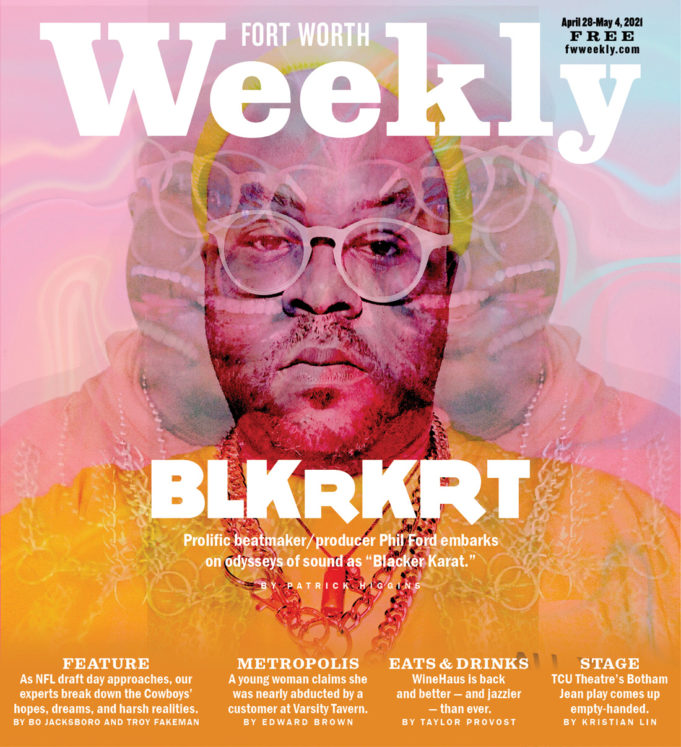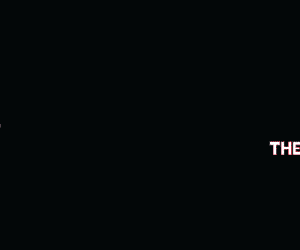As the technology has been scaled down to the consumer level, practically anyone with a computer can become a “producer.” Digital music production software has helped usher in a sort of paint-by-numbers system to beatmaking, and, as a result, a lot of contemporary hip-hop suffers from an increasingly stale, plasticine, over-compressed sound. Luckily, there are still a few traditional, sample-based composers employing the nearly lost art of cutting up records. Culling sounds from vast musical palettes and maintaining an appreciation for and paying homage to strong musical histories, these artists continue to be the bright colorful spots that elevate the otherwise drab and bland modern hip-hop soundscape. One such artist is Phil Ford. The striking genre-bending boom-bap compositions he creates under the name BLKrKRT (pronounced “Blacker Karat”) are a nod to the sample-based tradition but maintain an eye toward hip-hop’s continuing evolution.
“The name is a reference to how the music is made,” Ford explained about his unusual performative moniker. “It’s just a series of words that feel comfortable in the mouth, but there’s no vowels, which kind of represents the chopped-up quality of the sample-based process of making the music.”
As well as laying down the beats on which several rappers apply their craft — local booming-voiced MC Tornup and quirky Philadelphia product Darko the Super are two examples — Ford has been producing collections of his own instrumental tracks for several years. Most impressively, he releases material at an eye-popping clip of an album (which can feature upwards of 30 songs) every six months or so.

Photo courtesy of Phil Ford.
His latest debuted on April 20: Volumes VII, VIII, and IX of his Black Siddhartha series of Indian-inspired hip-hop mantras. The previous three-volume collection in the series was released just this past February. As the series’ title might suggest (Siddhartha Gautama being the original name of the philosopher Buddha), Ford employs samples from traditional Indian and New Age relaxation music to build loops, creating contemporary, calming, centering beats perfect for prying open one’s musical third eye.
“I’m more interested in textures and different scale possibilities,” he explained about the interesting hybrid sound he’s developed. “I’m just playing the internet. The entire internet is a giant musical instrument. I find sounds from everywhere. You may not have had a hand in creating the music contained in a particular sample, but you definitely have a hand in the context it’s used in. I’m really interested in trying to grow up hip-hop and bring different elements to it and take it into different places.”
Though Eastern music incorporates completely different musical structures and scales from those we recognize in the West, Ford said he didn’t really have trouble blending the traditional motifs with modern hip-hop.
“My entry point [for music production] is jazz, anyway,” he said, “so it was easy to work with — to look back at things that were tinged with or influenced by [Indian music], such as Alice Coltrane or Ravi Shankar with the [London] Philharmonic. I’m just trying to take it into a new, modern space.”
The Zen-like quality of the series’ material is significant for more than just its aural aesthetic. Ford said he uses the process of making the music as its own form of meditation. As prolific a creator as can be found — he composes several hundred pieces of music over the course of a year — he has plenty to lose himself in.
“It’s definitely become a meditative practice,” he said. “It’s an opportunity for me to get out of my own zone and have a little bit of escapism, so I try to [make music] every day. Last year, I did over 400 tracks. This year so far, I think I’ve only done about 150.”
As staggering as his work pace is, it represents only a portion of his creative output, and he confesses the pace may be slowing. As well as making beats for rappers and his own tracks, Ford has also started composing for film, most recently for a documentary about a ballet company in Florida, but he says his main creative focus lately is fashion.
“Everything is going in a different direction,” he said. “Music is really meant for the kids. I can’t have a conversation with artists about what’s going on [currently] if I’m out of touch with what’s going on. [BLKrKRT] is a celebration of me being connected to that tradition [of sample-based music]. It’s time to evolve into something else. I’ve been really into fashion, been studying it for the last few years. That’s where I’ll spend the lion’s share of my time from now on. I’ll still release records, just not at the same pace.”
Characteristic of his humble demeanor, Ford released Black Siddhartha VII, VIII, and IX, as all of his music, with little to no promotion. Simple social media posts announcing the release suffice for him. He said that for him, it’s not about money or recognition. It’s more about the process. He creates for himself, and if others find it and appreciate it, that’s just an added bonus.
“The problem with hip-hop is that it’s so often packaged as a ready-made product,” he said. “I shy away from that. I try to engage with people in a green way. I try to engage with them in a way that allows them to have the same level of escapism [while listening to my songs] that I have in creating them, and if that happens and they decide to drop me a coin, then cool. But aside from that, I have other ways of fulfilling my needs.”













Love the art Phil! Really nice composition <3
Thank you! Respect…
Thanks FWW! …esp the art dept!